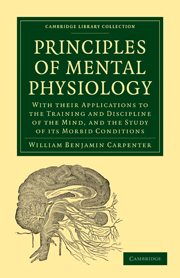 Principles of Mental Physiology
Principles of Mental Physiology Published online by Cambridge University Press: 29 August 2010
158. Neither the operations of the Intellectual Powers, nor the higher Emotional states, are immediately called-forth by Sensations; for in that stage of consciousness we merely recognize the fact that certain changes have occurred in our own “subjective” state, and do not refer these changes to any external or “objective” source. Of such a limitation, we occasionally meet with examples among the phenomena of Sleep, and in some of the conditions resulting from the use of Anæsthetic agents : for if we fall asleep whilst suffering from bodily pain, we may entirely lose all perception of the cause of that pain, and yet remain conscious of a perturbed state of feeling, which may affect the course of our dream; and when a surgical operation is performed in a state of incomplete anaesthesia, it is obvious that pain is felt without any distinct consciousness of its source, and the patient may subsequently describe his state as an uneasy dream. Such, it is probable, is the condition of the infant at the commencement of its Psychical life. “If,” as has been well remarked by Dr. J. D. Morell {Philosophy of Religion, p. 7), “we could by any means transport ourselves into the mind of an Infant before the Perceptive consciousness is awakened, we should find it in a state of absolute isolation from everything else in the world around it. Whatever objects may be presented to the Eye, the Ear, or the Touch, they are treated simply as subjective feelings, without the Mind's possessing any consciousness of them as objects at all.
To save this book to your Kindle, first ensure [email protected] is added to your Approved Personal Document E-mail List under your Personal Document Settings on the Manage Your Content and Devices page of your Amazon account. Then enter the ‘name’ part of your Kindle email address below. Find out more about saving to your Kindle.
Note you can select to save to either the @free.kindle.com or @kindle.com variations. ‘@free.kindle.com’ emails are free but can only be saved to your device when it is connected to wi-fi. ‘@kindle.com’ emails can be delivered even when you are not connected to wi-fi, but note that service fees apply.
Find out more about the Kindle Personal Document Service.
To save content items to your account, please confirm that you agree to abide by our usage policies. If this is the first time you use this feature, you will be asked to authorise Cambridge Core to connect with your account. Find out more about saving content to Dropbox.
To save content items to your account, please confirm that you agree to abide by our usage policies. If this is the first time you use this feature, you will be asked to authorise Cambridge Core to connect with your account. Find out more about saving content to Google Drive.